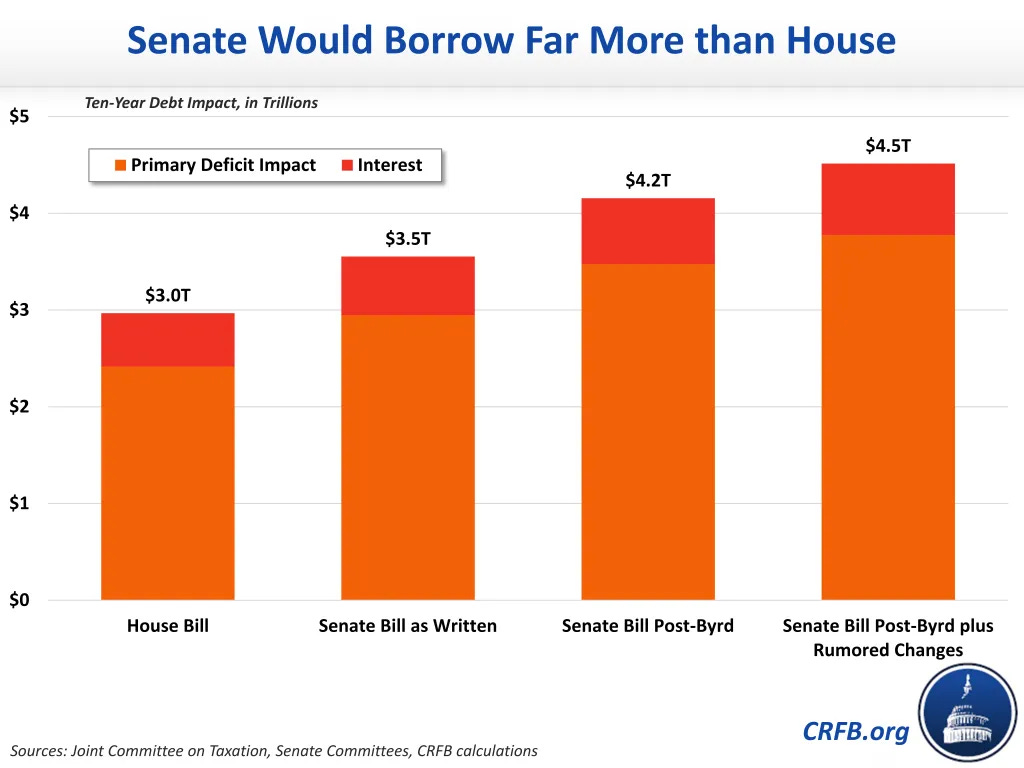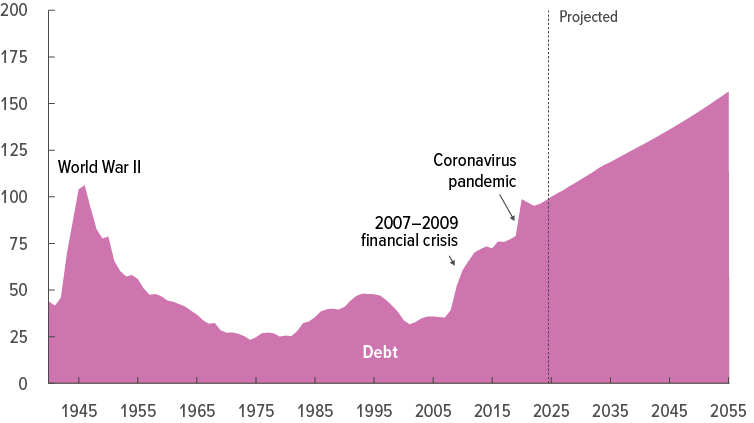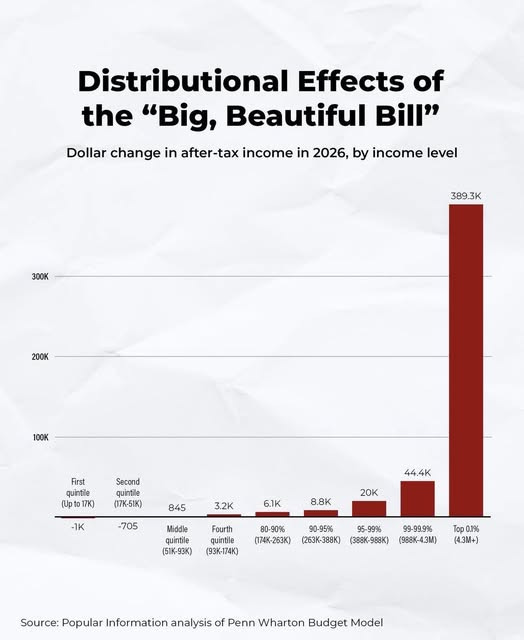We are nearing the end game on the horrific “Big Beautiful Budget Bill.” The Senate began debate on the bill. Since all indications are that that the Senate version of the bill will be the final version of the bill that reaches the President’s desk—if it passes both the House and Senate, which is still very much in the air—I will focus on that version of the bill.
There is much to hate in the bill, but here are four reasons why the bill is bad for Americans.
The Bill Will Dramatically Increase the Budget Deficit and National Debt
Late Saturday night, the Congressional Budget Office released its estimate that the Senate version would add almost $3.3 trillion in budget deficits over the next ten years. Other groups think the deficits could be even higher. The Committee for a Responsible Federal Budget—hardly a liberal group— estimates that the Senate version of the bill is likely to add $3.5 to $4.2 trillion to the debt through Fiscal Year (FY) 2034—or even more:
The debt impact could rise as high as $4.5 trillion if various rumored adjustments are made. That’s $500 billion to $1.5 trillion more in borrowing than under the House-passed bill and will mean the Senate is likely out of compliance with the House reconciliation instructions.
Even the conservative Tax Foundation rejects the notion that economic growth will pay for the revenue loss. It estimates a new increase in the debt of $3.8 billion:
The major tax provisions would reduce federal tax revenue by $4.7 trillion between 2025 and 2034, on a conventional basis. On a dynamic basis, incorporating the projected increase in long-run GDP of 1.1 percent, the dynamic score of the tax provisions falls to $3.8 trillion, meaning economic growth pays for about 19 percent of the major tax cuts.
The fiscal irresponsibility of this bill is reason enough to reject this reckless bill. As I noted in a previous post, we are facing a massive debt crisis, with our debt as a percentage of GDP to soon exceed the ratio of debt to GDP during World War II. This is not sustainable and the bill will make the problem even worse.
The bill is regressive.
Almost all tax cutting bills in recent years have been regressive, but they at least had the feature that all taxpayers—including those in lower tax brackets—received some tax cuts. The rich may have gotten more, but even the poor got something. This bill is different. It offsets some of the tax cuts with cuts to Medicare, Pell Grants and SNAP food aid. This means that lower income Americans in the lowest two income quintiles will suffer a net loss in household income. This truly is a reverse Robin Hood scheme. It steals from the poor to further enrich the wealthy.
One of the most egregious examples of a tax benefits heavily skewed to the most wealthy is the provision that makes permanent a 20% deduction for income that comes through “pass through” entities such as sole proprietorships, partnerships, LLC’s, and subchapter S corporations. The owner of any business that uses one of these entities gets a 20% tax deduction. The deduction cuts the top tax rate on this income by 20 percent, to 29.6 percent, compared to the 37 percent top rate that applies to wages and salaries.
Who benefits from this provision—as the chart above shows, the wealthy. The cost of doing this is significant. The Joint Committee on Taxation estimates the cost to be $730 billion over the next ten years.
From a policy point of view, there is no good reason for this tax benefit. Why should this income be treated any differently that salaries and wages? The stated purpose was for “parity” when non-passthrough corporations had their taxes reduced to 21%, but this parity argument is simply silly. Non-passthrough corporations are taxed twice on this income—one at the corporate level and the second at the individual level. The Bipartisan Policy Center did an analysis showing that the parity argument is simply wrong.
The Bill Seriously Harms Clean Energy and Related Industries
When the House bill reached the Senate, many hoped that the Senate would modify the bill’s elimination of tax incentives for clean energy technology. Sadly, the bill has gotten even worse. The bill actually accelerates the elimination of Clean Energy incentives. Even worse, it adds taxes on many clean energy projects, which will make the problem even worse.
The Senate version of the bill adds an excise tax on any wind and solar project (as well as batteries, geothermal and nuclear projects) if a certain percentage of the project’s components are sourced from countries like China. Since China dominates much of the material and components used in these projects, this tax could be devastating. Politico explains:
“It’s a kill shot. This new excise tax on wind and solar is designed to fully kill the industry,” said Adrian Deveny, founder and president of policy advisory firm Climate Vision, who helped craft the climate law as a former policy director for Democratic Senate Leader Chuck Schumer.
Analysts at the Rhodium Group said in an email the new tax would push up the costs of wind and solar projects by 10 to 20 percent — on top of the cost increases from losing the credits.
“Combined with the likely onerous administrative reporting burden this provision puts in place, these cost increases will lead to even lower wind and solar installations. The impacts of this tax would also flow through to consumers in the form of higher electricity rates,” Rhodium said.
There are also other provisions seemingly designed to destroy clean energy. It eliminates accelerated depreciation for wind and solar investments. The bill also eliminates consumer subsidies for rooftop solar, electric vehicles, heat pumps and other energy-efficient technologies. Taxpayer will have just a few months (for electric vehicles) or until the end of the year (for heat pumps and rooftop solar) to take advantage of the credits before they expire.
Noah Smith has a must read post detailing how the bill will decimate clean energy investments.
The Bill will result in millions of people losing healthcare coverage because of cuts in Medicaid and Obamacare
As I noted in a previous post, the House version of the Bill included massive cuts in Medicaid. The Senate version is even worse. It expands the work requirement further than the House to include poor parents of children older than 14, and it also expands the restriction on medical provider taxes used as a strategy by many states use to finance Medicaid.
Accordingly to the Congressional Budget Office published late Saturday night, the Bill would mean11.8 million more Americans would lack health insurance by 2034. Federal spending on Obamacare, Medicaid and Medicare would be reduced by over $1.1 trillion between now and 1934.
As the New York Times explains, “The scale of the proposed reductions in Medicaid is unprecedented in the history of the program, which has tended to expand coverage over time since its creation in 1965.”
This is not a done deal. The Senate will likely vote on this bill in the next day or so. Passage is hardly a certainty, with numerous Republican Senators—including Paul, Tillis, Collins and Murkowski—have expressed outright opposition or serious concerns about the Bill. It is also not entirely clear that there are votes in the House for this version of the bill. If you agree with me that this is a very bad bill, pick up the phone and call your Senators and urge them to vote No, and write letters to your local paper about why this bill is bad for America.








